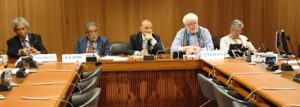
“Human Rights Globally, Promotion and protection of Human Rights are enshrined in the Universal Declaration of Human Rights and the Charter of the United Nations including peoples right to Self-Determination.”
Geneva – A Parallel Event was organised under the auspices of International Human Rights Association of American Minorities (IHRAAM) supported by International Commission for Human Rights (ICHR), Indigenous Peoples and Nations Coalition (IPNC) and Koani Foundation at the 38th session of the United Nations (UN) Human Rights Council at the Palais Des Nations, Geneva in Room XXVII. The title of the event was: “Human Rights Globally, Promotion and protection of Human Rights are enshrined in the Universal Declaration of Human Rights and the Charter of the United Nations including peoples right to Self-Determination.” The event was moderated by Barrister A. Majid Tramboo and he was joined by fellow panelists Professor Alfred De Zayas, Frank Schwalba-Hoth, Professor Nazir A. Shawl, Ambassdor Ronald Barnes and Leon Kaualhao Siu.
Barrister Tramboo (IHRAAM & ICHR) opening remarks were focused on the most recent High Commissioner’s Report prepared by Zeid Ra’ad Al Hussein on Jammu and Kashmir (titled: Report on the Situation of Human Rights in Kashmir: Developments in the Indian State of Jammu and Kashmir from June 2016 to April 2018, and General Human Rights Concerns in Azad Jammu and Kashmir and Gilgit-Baltistan) released on 14th June 2018. Whereas Barrister Tramboo welcomed His Excellency’s recommendation to initiate an Independent enquiry commission to investigate the allegations of gross human rights atrocities in Indian occupied Kashmir, however, he proposed that a panel discussion must take place on the elements of the report either by the time the of the 39th or 40th session of the Human Rights Council will take place. Further, Barrister referred to the IHRAAM/CPG-OHBCUD intervention at the 22nd session of the Working Group of Experts on Peoples of African Descent (WGEPAD) and highlighted the Salient features of the intervention including the activities with which the Core Planning Group is presently engaged (copy intervention attached).
Continuing the discussion, Frank Schwalba-Hoth (Political Strategist, founder German Greens and former MEP) addressed the issue of self-determination globally and highlighted that states are frightened to ever accept or give states the right to self-determination is down to the changing of the borders. He explained that the European Union is always open to selfdetermination so long as current borders are not violated or misaligned. Mr Schwalba Hoth’s final remarks were entwined into the Kashmir dispute, he said that whilst the Kashmir dispute is justified amongst various European states, they could not be publically vocal to support the issue because of their own self-determination issues.
Professor Nazir A. Shawl (Chairman, SACFPHR) commented that the High Commissioner’s Report is indicative of the promise given to Jammu and Kashmir for the protection of human rights and fundamental freedoms. Professor Shawl referred to the report for highlighting the gross human rights atrocities in Jammu and Kashmir spanning from June 2016 to April 2018. He went on and commented that the report was symbolic and historic to propel the Kashmir issue into the limelight. Ambassador Ronald Barnes (Chair and Director of Indigenous Peoples and Nations Coalition; Head of Mission in Geneva for the Alaska decolonization movement) praised the work done by Barrister Tramboo and others and praising the nature and contents of the High Commissioners report which highlights the atrocities in Jammu and Kashmir. Ambassador Barnes went on to analyse the indigenous movement in Alaska in the direction of the right to self-determination.
The discussion moved on with Leon Kaualhao Siu (Minister of Foreign Affairs and spokesman for the Hawaiian Kingdom) who explained whilst Hawaii have their own issues on human rights and self-determination that the issue is widespread across the globe. He went on and said that Hawaii’s situation is not so dire but that educating and talking to people about the situation is the biggest obstacle in the Hawaii issue. He was thankful that the UN offers him a platform to bring the Hawaii question to the forefront of the self-determination and human rights discussion across the world. He felt that the UN is now taking the issue seriously and looking into the issue more carefully.
The event concluded with a key intervention by Professor Alfred de Zayas (Independent Expert for the Democratic and International Order for the Human Rights Council and Secretary of the Human Rights Committee [former]). Professor De Zayas enunciated that every state in their plight for self-determination has the fundamental right to fair vote and fair referenda. He went on to emphasize that Article 19 of the International Covenant for Civil and Political Rights (ICCPR), the International Covenant for Economic Social and Cultural Rights (ICESCR) and the UN Charter words are clear in that these international legislations do not target a specific group of people but rather that everyone is entitled to their own basic rights and that is inclusive of the right to determine one’s own statehood.
He concluded by endorsing the High Commissioners concluding remarks in the report and specifically emphasized the need to establish a commission of inquiry to conduct a comprehensive independent international investigation into allegation of human right violations in Kashmir. Professor De Zayas called upon the UN to investigate the allegations of human rights violations in Kashmir based on the powerful nature of the report. He explained that the Kashmir issue has been on the UN agenda since 1947 but criticsed the UN for their failure to resolve the issue till date. He called upon the General Assembly to revisit the resolutions that were adopted at the time of the Kashmir issue because they were ‘fundamentally flawed’ because the indigenous population were prevented from fair referenda or even voting on their right to self-determination.





